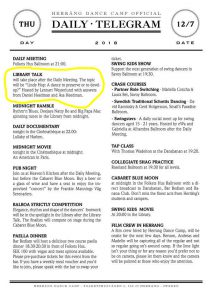Soul Food Junkies (broadcast version) from Sonia Gonzalez-Martinez on Vimeo.
This is a really great little docco. As you’ve probably figured out, one of my favourite ways of experiencing the places I visit is to see what people eat, how they eat it, and where they get it. I especially like ‘ordinary’ or ‘everyday’ food – supermarkets, greengrocers, delis, markets. The places where people buy their everyday food.
Sitting here in Herrang, at a dance camp devoted to black dance history, I’m struck (once again – for the millionth time) by just how selective this ‘history’ is. It’s heavily vetted by middle class white people, and barely touches on the everyday lives of black people in the 20s/30s/40s, let alone today. One of the very real consequences of this, is that lindy hop and tap and all those other black dances are even more clearly separated from the black vernacular.
The other night there was a library talk about lindy hop, with the provocation: “lindy hop: a dance to preserve or develop?” All three of the people on the panel were white, middle class Swedes. I find this thought more than a little troubling. This was clearly a statement of ownership of black dance. By white business owners. I couldn’t attend, and frankly, I couldn’t quite bear the thought of another belaboured discussion where white people give endless excuses and reasons for why what they are doing is ok, because this one time a black guy told them so. To paraphrase an important movement in lindy hop today: the voices of black lindy hoppers matter. Time to stop talking and listen, white lindy hoppers.
Anyways, this documentary is about the way black families can both preserve and innovate, by focussing on community development (specifically in terms of addressing food deserts and access to ingredients in black communities, as well as cooking). Here, the cultural practices and products – cooking, eating and food – are clearly marked as central to black family life, and therefore of vital importance to black cultural life. This filmmaker makes it clear that stepping aside from the commodification of processed food and black eaters’ engagement with food only as consumers is a serious issue. Growing your own greens is as important as dancing your own dances and making your own music; it is soul food.

